The Short: I just read an SF story by Winona McClintic that I loved, “In the Days of Our Fathers“, a short story in The Magazine of Fantasy, Fall 1949, the first issue of what today is called The Magazine of Fantasy & Science Fiction. I am pretty sure this is the first story of hers that I’ve read. My first reactions were, “Wow! This is a great story!” and then, “Who is this author?” See below for the answer.
The Long: I’ve been reading short speculative fiction from 1949 to answer a question I had about the best short speculative fiction of 1949. I’ll write about that separately and link to it here when I do.
One way that I identified likely 1949 stories to read was to look for stories that had been reprinted. This is not a guarantee, but it does show that at least one person thought that a story was worthwhile.
One of the stories that I loved was by Winona McClintic, “In the Days of Our Fathers“, a short story in The Magazine of Fantasy, Fall 1949, the first issue of what today is called The Magazine of Fantasy & Science Fiction. This story was reprinted in the first “Best Of” anthology from F&SF, “The Best from Fantasy and Science Fiction“, Anthony Boucher & J. Francis McComas editors, 1952 Little, Brown. I had never heard of this author and I don’t remember ever reading anything by her.
There is a very modest amount of information in ISFDB on her:
Birthplace: Germany
Birthdate: 1921
Deathdate: 2003
Language: English
I was able to confirm almost all of that, although it’s not at all clear to me if the 2003 death date is correct or if her death occurred earlier. I have seen authors with less information noted there or elsewhere on the internet, but this is a fairly modest amount of information. The best entry I found for her fiction was at Mark R. Kelly’s “Science Fiction Awards Database”, where there are entries under both Titles and Chronology for her.
In that first issue of The Magazine of Fantasy, Fall 1949, Editors Anthony Boucher & J. Francis McComas noted,
Mm McClintic has already delighted connoisseurs with her imaginative verse in the Atlantic; her first published story brings to the fantasy field a welcome new talent, wedding the subtlety of a poet to the ingenuity of a story-teller.
In the leadup to this publication, the fanzine Bloomington News Letter August 1949 No. 11 has a write up on the upcoming “The Magazine of Fantasy”. Editor Anthony Boucher is quoted:
Boucher states FANTASY will resemble EQMM in price, format and editorial policy, attempting to do for the fantasy field what Ellery Queen has done for the detective story: create a fresh, new market of high literary standards, untrapped by formula, open to every kind of work providing it is well done and well written. He is interested in digging up obscure lost classics and discovering valuable new authors, samples of both to be displayed in the first issue.
It appears that Winona McClintic and her short story “In the Days of Our Fathers” was a good fit with these interests. I can only speculate that perhaps she and her fiction came to their attention through her poetry in Atlantic. Looking at the Atlantic “Winona McClintic” page online, I see seven poems published from 1945 to 1955.
She graduated from Mills College in Oakland with an AB degree in 1942, completing a Masters of Arts in English in Berkeley in 1949 after a pause for service in World War II. She married first husband John Adams Brettman in 1944 and was divorced by 1950.
In Atlantic November 1956, her non-genre story “A Heart of Furious Fancies” was published. The editors noted,
WINONA MCCLINTIC was a radioman second class in the United States Navy during World War II and the Korean War. She graduated from Mills College, contributed poems to the Atlantic, and was at work on her Ph.D. (under the G.I. Bill) when matrimony intervened. She married an engineer and while he, she says, “fiddles with things on airplanes,” she finds time to raise guinea frigs and write.
My thanks to Jan Vaněk jr., who pointed out that “guinea frigs” was certainly an OCR (optical character recognition) error from the Atlantic’s scanning of the original paper version. The end of that sentence should read, “…she finds time to raise guinea pigs and write”. I thought “guinea frigs” was some kind of inside joke that I did not get, but I think Jan is on target.
As noted above, it appears she served in the Korean War as well.
She showed up in several fan and genre writing items at http://www.fanac.org in the 1950s.
- In the Fantasy-Times, Vol. 1 #235, November Second 1955 issue, she is listed as a new client of the (Forrest J.) Ackerman Literary Agency.
- In the Fantasy-Times Vol 1. #253, August 16 1956 issue, she is noted as attending Westercon 9 in Oakland, CA.
- In the Science Fiction Times Vol. 12 #277 August Second 1958 issue, she is listed as attending Westercon 10.
It appears her first story, “In the Days of Our Fathers”, is the only one of her seven genre stories that was reprinted in an anthology. All but one of her genre stories was published in F&SF, and all of her poems. Quite a few of her poems were reprinted in F&SF “Best Of” anthologies and nowhere else, so clearly the F&SF editors liked her poetry.
In the editor’s blurb in The Magazine of Fantasy Fall 1949 for “In the Days of Our Fathers”, it was stated that this was anti-science fiction, like Huxley’s “Brave New World” or Leiber’s “Gather, Darkness“. If you take this to mean science fiction where science is not used to solve a problem or change the world, I agree.
Her non-genre story “A Heart of Furious Fancies” from Atlantic November 1956 was reprinted in “The Best American Short Stories 1957“, Martha Foley editor, Houghton Mifflin. That is a fairly major recognition of her talent as a writer.
She married for the second time in 1955, to engineer William E. Martin. I have not found out much about her life after 1961, when her last SF story was published. I found no evidence that she published anything else after 1961, but I could be missing something.
A 1970 obituary for her father, Colonel Brown S. McClintic, a retired officer of the Army Medical Corps, listed her as a living daughter under her married name “Winona M. Martin”.
In Science Fiction Review (Geis) 17, May 1976, there is a letter from Forrest J. Ackerman looking for the whereabouts of a number of people including “Winona McClintock”. From the context, this might have related to payment or rights.
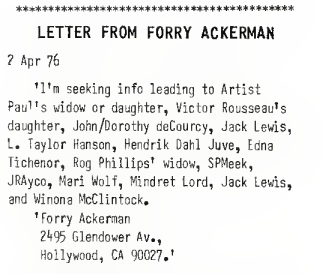
The Mills [College] Quarterly Winter 2003 has her listed in the “Gifts In Memory” feature as a 1942 Mills College graduate. That implies to me that she was known to be deceased by 2003, but not when she died. I was unable to find any other obituary or death information.
While Winona McClintic and her fiction is arguably somewhat obscure, she is not entirely forgotten.
The Fantasy & Science Fiction page at SF Site has this to say,
Born 1921, in Germany, of American parents. Grew up in southern California. Educated at Mills College (Oakland) and UC Berkeley. Married William E. Martin in the mid-50s. Moved to the Netherlands with her husband and children in 1962. Passed away in 1977.
I reached out but have not yet confirmed where the information in the last two sentences came from.
In the 2006 book “Partners in Wonder: Women and the Birth of Science Fiction, 1926-1965“, editor Eric Leif Davin said this about Winona’s 1949 story:

In 2015 and 2016, Galactic Journey reviewed her last two stories, with a not very positive response. https://galacticjourney.org/tag/winona-mcclintic/
In a 2016 post, Steve Dodson of The Language Hat was taken by her couplet from the story (“The Days of Our Fathers”), “Keats had TB, Shelley drowned, Shakespeare lies in the cold, cold ground.” He could not remember where it was from, and was surprised to discover it was from an issue of F&SF he had read a long time ago by an author and story that is definitely forgotten by most.
In the The Magazine of Fantasy & Science Fiction, September/October 2019, the 70th Anniversary issue, Robert Silverberg has a column titled, “Three Score and Ten“. This column celebrates both his experience with the first 1949 issue of what started as “The Magazine of Fantasy” and of his first getting published in F&SF. It mentions Winona McClintic and her story In the Days of Our Fathers” twice. He starts with,
The entire appearance of the magazine was sophisticated and distinguished, as were, I would soon discover, its contents. Quarterly publication was promised and the first number was dated Fall, 1949. That first issue was, as its title indicated, heavily weighted toward fantasy: a few reprinted ghost stories of the Victorian era, some new material by writers like Stuart Palmer and Philip MacDonald whose work I did not know, and just two stories recognizable to me as science fiction—Theodore Sturgeon’s lighthearted “The Hurkle Is a Happy Beast” and a strange little piece by one Winona McClintock called “In the Days of Our Fathers,” the sort of experimental literary story that no other magazine of its day would have published.
He goes to say,
Of course I thought the Sturgeon was wonderful. The McClintock was baffling but fascinating. The classic ghost stories were beautiful things. The newly published fantasies by Palmer and MacDonald were clever and original. The design of the magazine made it far more attractive than any of the other science-fiction magazines, Astounding included. There was, in fact, nothing else like it.
I find Silverberg’s comments about “In the Days of Our Fathers” to be insightful.
I also see that there was some confusion on how to spell her last name, both by Forrest J. Ackerman and by Robert Silverberg.
I see her personal, signed by her copy of the L. Sprague de Camp collection, “The Continent Makers and Other Tales of the Viagens“, 1953 Twayne Publishers, for sale at www.ABE.com. Her copy of “Preferred Risk” by Edson McCann (Frederik Pohl and Lester Del Rey), 1955 Simon & Schuster, is also for sale. This suggests strongly but does not establish that she has been dead for a while.
In order to write this essay, I went and read the rest of the published Winona McClintic genre stories as identified in ISFDB.
I loved two of these stories, her first (“In the Days of Our Fathers“) and her last (“Four Days in the Corner“) published genre stories. I don’t have a history of liking experimental or post-modern fiction. I tend to like stories with good characters and a plot that goes somewhere. However, although they are both somewhat inconclusive and very different from many other genre stories, the last one especially, I strongly recommend both “In the Days of Our Fathers“, F&SF Fall 1949, rated 4/5, or “Great”, and “Four Days in the Corner“, F&SF August 1961, rated 3.8/5, or “Great”.
I enjoyed several of the other stories:
- “There Did Not Remain a Word to Say“, a story of an academic and three leprechauns, F&SF May, rated 3.6/5, or “Very good”.
- “Tea from Chirop Terra“, a madcap tale of intergalactic invasion by batlike aliens, and high society, F&SF October 1956, rated 3.6/5, or “Very good”.
- “The Way Out of Town“, a very good but somewhat inconclusive story of life, love and snakes, F&SF December 1960, rated 3.7/5, or “Very good”.
She did have two stories that I was disappointed in and would not recommend in any way except for those needing to be Winona McClintic completists, both rated in the “Good” range:
- “The Ultimate Price“, an ordinary tale of love before marriage with unhappy consequences, F&SF February 1956, rated 3.5/5, or “Good”.
- “The Makers”, a story of future artificial means of making life, realized in a very disappointing fashion, Fantastic Universe February, rated 3.3/5, or “Good”.
I find Winona McClintic, her fiction and her life interesting and worthy of being remembered. I’m especially glad I read her first and last stories as noted above. Although I am not a fan of poetry and have not read any of her poetry other than in “In the Days of Our Fathers”, I do love her use of language especially in her first and last stories, and I’m sure that is influenced by both her education and love of poetry.
Detailed Reviews/Comments – SPOILERS ALL ALL
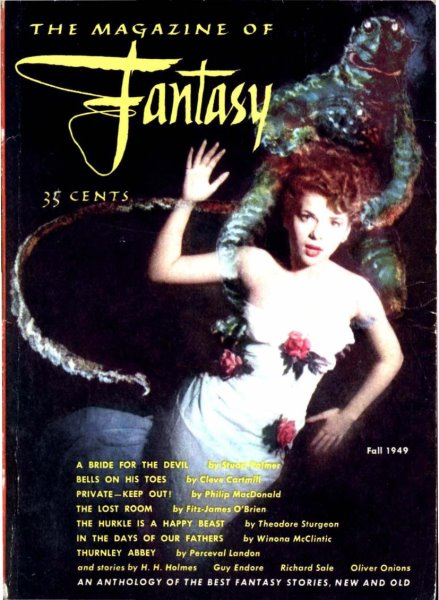
“In the Days of Our Fathers“, a short story by Winona McClintic, F&SF Fall 1949. Only reprinted in “The Best from Fantasy and Science Fiction“, 1952-03-00 ed. Anthony Boucher, J. Francis McComas Little, Brown. In the editor’s blurb in The Magazine of Fantasy, it was stated that this was anti-science fiction, like Huxley’s “Brave New World” or Leiber’s “Gather, Darkness“. If you take this to mean science fiction where science is not used to solve a problem or change the world, I agree. A young person in a very “sane” future discovers some very potent writings of fiction by an un-sane, shamed and perhaps deceased uncle, including a song. There is a memorable couplet by the uncle, “Keats had TB, Shelley drowned, Shakespeare lies in the cold, cold ground.” This appears to be original to the author. The protagonist resolved to keep and remember these things while not letting on. This story has one hell of a voice, and it’s Winona McClintic’s first published story. This is probably the most memorable SF I’ve read from 1949, for all that it’s quite obscure with only one reprint. Rated 4/5, or “Great”.
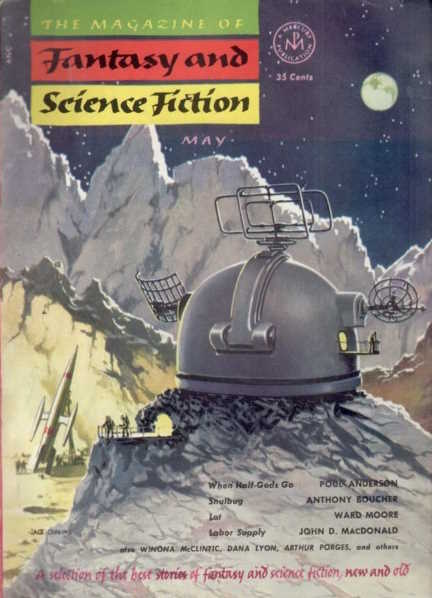
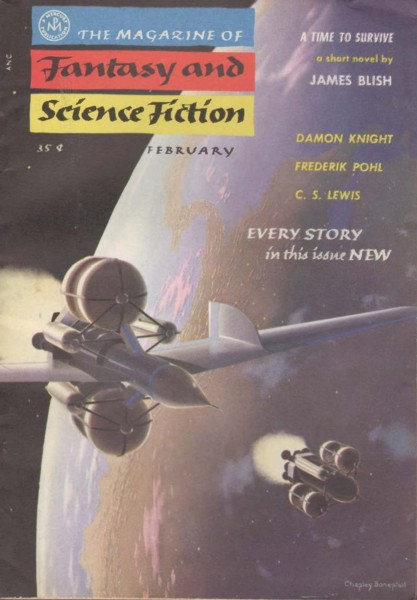
“There Did Not Remain a Word to Say“, F&SF, May 1953. An entertaining and interesting tale of three leprechauns and an academic. By this time McClintic had an AB and MA in English, and was probably working on her PhD, so I can see her familiarity with academia. In the same issue of F&SF as Ward Moore’s “Lot” and Anthony Boucher’s “Snulbug“. Rated 3.6/5, or “Very good”.
“The Ultimate Price“, F&SF February 1956. An ordinary tale of love before marriage, an unhappy couple, and necromancy, with an unhappy result. In the same issue as the classic “The Country of the Kind“, a short story by Damon Knight. Rated 3.5/5, or “Good”.
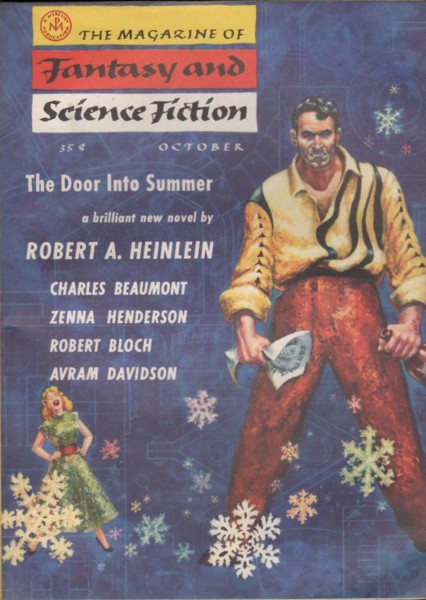
“Tea from Chirop Terra“, F&SF October 1956. A madcap tale of intergalactic invasion by batlike aliens, and high society. “J. Alfred Pru____” and “Etaoin Shrdlu” (the name of a Fredric Brown story) appear as well, which was amusing. In the same issue of F&SF as the classic Zenna Henderson short story, “The Anything Box“. Rated 3.6/5, or “Very good”.
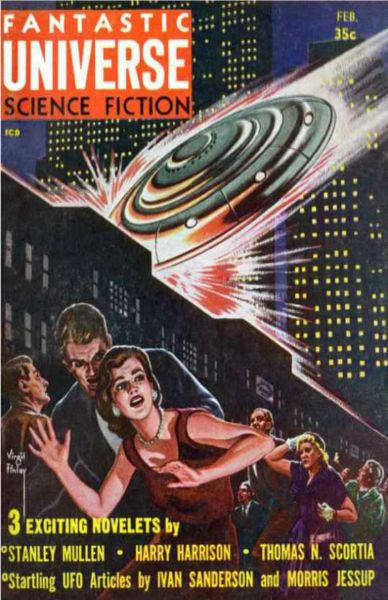
“The Makers”, Fantastic Universe February 1958. A future retired professor invents the means of making life in a future with very few children or pets. This could have been a great story, conceptually, but the execution produced a very mundane result. Rated3.3/5, or “Good”.
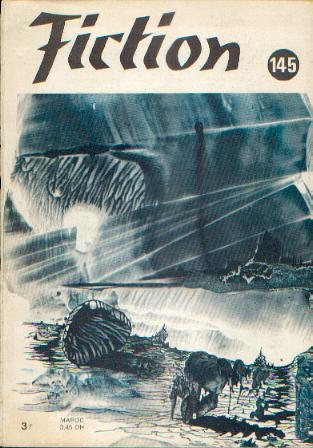
“The Way Out of Town“, F&SF December 1960. I’m not ready to say this is a great story, but it’s a very good story of life, love and snakes, even there is no resolution or outcome. Giant metal snakes block all means of access into and out of a town. A man and a woman have a relationship, but are kept apart by the snakes. This had one French language reprint in the magazine Fiction. This issue of F&SF also had the Algis Budrys classic novella, “Rogue Moon“. Rated 3.7/5, or “Very good”.
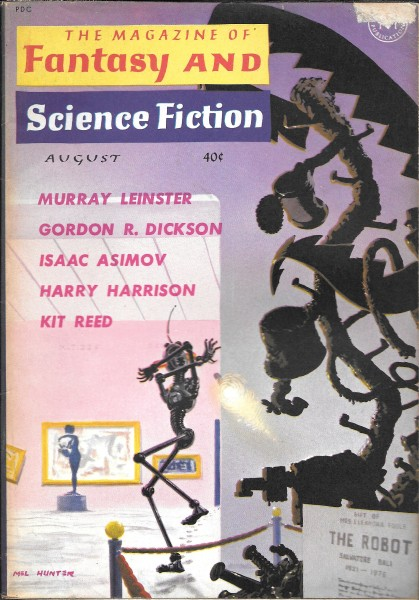
“Four Days in the Corner“, F&SF August 1961. This is a damn interesting story, for all that I never figured out what was going on. One of my fundamental pleasures and goals in reading speculative fiction is to figure what is going on with the characters, plot and universe portrayed. This story involves dreams and words which are either misused or transmuted. A man and a woman, in fear of an undefined them. Corners are important. Even though I never figured out what was happening, I loved the voice and the words. Some aspects of this reminded me of fantasy or speculative fiction by Gene Wolf and Avram Davidson. Rated 3.8/5, or “Great”.
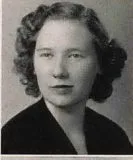
Leave a comment